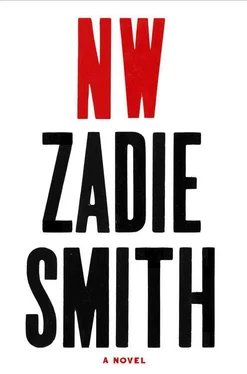25. Vivre sa vie
This sudden and violent divergence in their tastes was shocking to Keisha, and she persisted in believing that Leah’s new tastes were an affectation, unrelated to anything essential in her being and largely taken up to annoy her oldest friend. “Bell me later,” said Leah Hanwell and jumped on the bus’s open rear end. Keisha Blake, whose celebrated will and focus did not leave her much room for angst, watched her friend ascend to the top deck in her new panda-eyed makeup and had a mauvais quart d’heure wondering whether she herself had any personality at all or was in truth only the accumulation and reflection of all the things she had read in books and seen on television.
26. Relative time
A number of factors — modest style of dress, early physical maturation, glasses — combined to make Keisha Blake look considerably older than she in fact was.
27. 50ml vodka
Instead of being known as a “personality,” Keisha Blake now became indirectly popular as a function. She bought alcohol for a lot of people who believed they looked too young to get it themselves, and the irrational belief in Keisha’s “talent” in this area became self-fulfilling, as invested with all this belief in her infallibility she came to believe in it herself. Still, it was strange to buy booze for Leah. “It needs to be the size to fit in my back pocket.” “Why?” “Because there’ll be two hundred people moshing up and down and you can’t be pissing around with a wine glass.” As the event did not start until late, Leah first came to Keisha Blake’s room to hang out and drink and talk until it was time for her to go. Probably later she would meet someone with hair in his eyes and do sex. “I saw Nathan at the chippy yesterday,” said Keisha. “God, Nathan,” said Leah Hanwell. “He’s not coming back next term,” said Keisha Blake. “They turned it into an expulsion.” “That was a matter of time,” said Leah Hanwell, and opened the window to have a fag. Leah drank some more and spent a long time twisting the radio knob looking for a pirate station she didn’t find. At around ten fifteen p.m. Leah Hanwell said: “I don’t think women can really be beautiful. I think they can be so attractive and you can want to shag them and love them and blah blah but I think really only men can be completely beautiful in the end.” “You reckon?” said Keisha, and disguised her confusion by drinking deeply from her mug of tea. She was not at all sure to whom the second-person pronoun was meant to refer.
28. Rabbit
On the eve of her sixteenth birthday a gift was left for Keisha Blake, outside the flat in the corridor. The wrapping showed a repeating butterfly pattern. The card, unsigned, read UNWRAP IN PRIVATE, but the slant of the p and the pointy w told her it was the hand of her good friend Leah Hanwell. She retreated to the bathroom. A vibrator, neon pink with revolving beads in its gigantic tip. Keisha sat on the closed lid of the toilet and made some strategic calculations. Wrapping the dildo in a towel, she hid it in the room she shared with Cheryl, then took the box and wrapping paper down to the courtyard to the public bins by the parking bays. The following Saturday morning she began approximating the early signs of a cold, and on Sunday claimed a severe cough and stomach ache. Her mother pressed her tongue down with a fork and said it was a shame, Pastor Akinwande was going to talk on the topic of Abraham and Isaac. From the balcony Keisha Blake watched her family walk to church, not without regret: she was sincerely interested in the topic of Abraham and Isaac.
29. Rabbit, run
But she had also privately decided she was a different kind of believer from her mother, and could survive the occasional anthropological adventure into sin. She returned inside and raided an alarm clock and calculator for their batteries. She did not employ any mood lighting or soft music or scented candles. She did not take off her clothes. Three minutes later she’d established several things previously unknown to her: what a vaginal orgasm was; the difference between a clitoral and a vaginal orgasm, and the existence of a viscous material, produced by her body, that she had, afterward, to rinse out of the ridges along the vibrator’s shaft, in the little sink in the corner of the room. She had the dildo for only a couple of weeks but in that time used it regularly, sometimes as much as several times a day, often without washing in between, and always in this business-like way, as if delegating a task to somebody else.
30. Surplus value, schizophrenia, adolescence
“We should go like this here,” said Layla and sang a new note and Keisha made a notation. “Role models,” sang Layla, in the new key, “bringing the truth, bringing the light.” Keisha made a further note. “Making it right,” said Layla, and then repeated the same words but sung as music, and Keisha nodded and made a further notation. Layla was genuinely musical and her voice was beautiful. Her mother was a well-known singer in Sierra Leone. Keisha could not sing and played the recorder rather badly. She had taught herself musical notation in a few weeks using piano music taken from church. As with everything that involved symbols and/or signification it had not been difficult for Keisha to do this and she did not know why that should be so or what such facility meant, nor why her sister Cheryl had not been similarly blessed, nor what she was meant to do about it or with it, or if “it” was a noun or a verb or had any material reality at all, outside of her own mind. The two girls were writing a song for the under-12 faith group that met in this back room on Thursdays after service. They were good friends, Keisha and Layla, though not as close as Keisha and Leah. The fact was they had not been bonded by a dramatic event, although in the mind of the church they belonged together in a natural and inevitable way. “Leading the way,” sang Layla. Keisha made a note. She could smell her own vagina on her hands. Now Layla reverted to speaking: “Or something like, ‘Sisters today, leading the way.’” Keisha made a note of this and placed parentheses around it to signify it was not yet a lyric set in stone. If these are “talents”—the ability to sing, or to quickly comprehend and reproduce musical notation — what kind of a thing is “talent?” A commodity? A gift? A prize? A reward? For what? “We follow the truth, we follow the light!” sang Layla, which had already been set in stone both musically and lyrically. With nothing to note down Keisha became anxious. Across the room hung a mirror. Two admirable young sisters, their hair still plaited by their mothers, sat on the edge of a makeshift stage, one singing and the other transforming music into its own shadow, musical notation. That’s you. That’s her. She is real. You are a forgery. Look closer. Look away. She is consistent. You are making it up as you go along. She must never know. “And then from here to here,” sang Layla, singing these words and therefore putting the instruction itself to music. Keisha made the notation.
31. Permission to enter
Though they were five, the Blakes occupied a three-bed, one bathroom unit, in which only the youngest boy, Jayden, had a room of his own. As far as Keisha could make out, privacy did not seem of any importance to her brother, who was eleven, and still prone to streaks of domestic nudity, but for her own person it was a necessity, more so with every passing day, and the arrival of the dildo prompted her to reopen an old debate with her mother.
“It’s a human right!” cried Keisha Blake. History GCSE module B16: The American Civil Rights Movement . Module D5: The Chartists.
“If there’s a fire you’d burn up in your room,” said her mother, “This Cheryl’s idea? People who want locks got something to hide.”
Читать дальше











